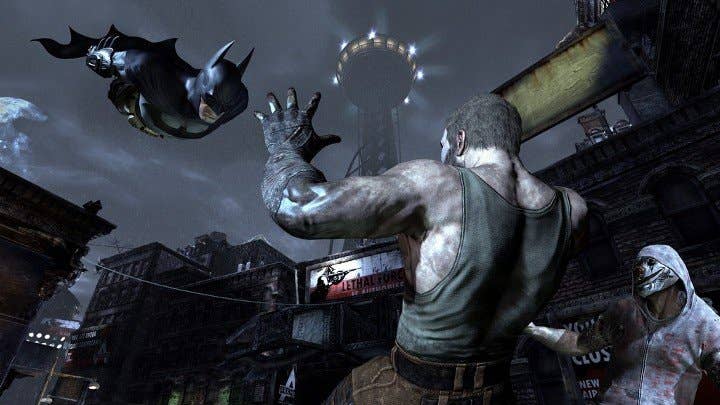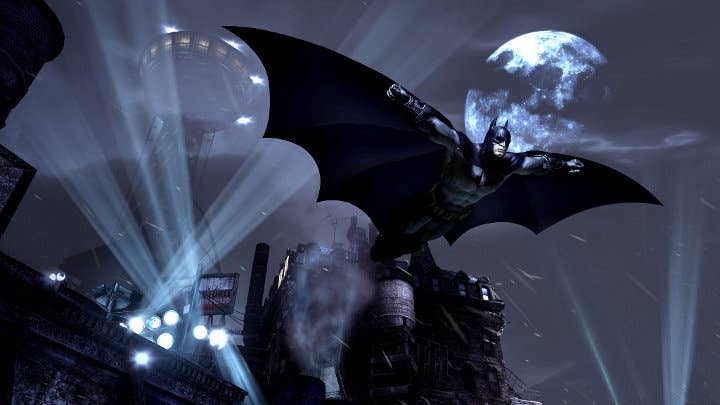Critical Consensus: Batman: Arkham City
Rocksteady somehow finds room for improvement over the brilliant Arkham Asylum
Right now, the Xbox 360 version of Batman: Arkham City has an average of 95 on Metacritic. It could go up, it could go down, but with 36 reviews already accounted for it's unlikely to move significantly in either direction. If it stays the same, Arkham City will be the fifth highest-rated game in the platform's history, and on PlayStation 3 it is performing with even more impressive consistency: a Metacritic average of 97 at the time of writing, a point ahead of Uncharted 2, a point behind Grand Theft Auto IV.
Any game so universally admired leaves no room for breadth of opinion. The simple fact is that, with the excellent, tightly constructed Arkham Asylum as foundation, Arkham City does very little wrong. Everything that worked beautifully before has been tweaked and massaged to function at least as well now: Detective Vision? Check; Brutal, intuitive combat? Check; Psychological stealth tactics? Check.
This is reflected in Arkham City's reviews. Evidently, the critical community reached the simultaneous conclusion that, when a game does so much well, there is no justification for treading familiar ground. For The Daily Telegraph's Tom Hoggett, who awards Arkham City the full five stars, the game's most notable improvement is suggested in the title.
"The glorious madhouse that Rocksteady built in the first game has spilled into the streets, stretching far and stretching high, verticality and dark skies replacing poky corridors and air ducts. The scope has considerably widened but the detail hasn't suffered, with a remarkable amount of care lavished into the minutiae of every filthy street corner of Arkham City."

"Information gathered on the streets of Arkham City often lead Batman to a villain's hideout, often normal municipal buildings twisted into the psyche of its deranged tenant. The Penguin lurks within a natural history museum, with busted dinosaur animatronics whirring alongside glass cabinets filled with skeletons and shelves of military-grade grenade launchers, while the main hall is a frozen over lake patrolled by a great white shark named Tiny."
Eurogamer's Christian Donlan also praises Rocksteady's handling of Batman's enviable line-up of villains, both in their skilful realisation and the sheer number the player encounters. It is a key contributor, Donlan argues, to Arkham City's greatest trick: the unmistakable, all-consuming impression that you are Batman.
"It's a Batman simulator as much as a Batman game," he writes in his 9 out of 10 review. "It's wish fulfilment on a grand scale."
Like Hoggett, Donlan praises the grimy sandbox of Arkham City, but principally for the freedom of movement it affords the player. Arkham Asylum was Batman confined; this is Batman unbound, glowering from rooftops, swooping through the chill sky, planting his boot in the face of another unsuspecting goon.
Suddenly, Arkham City, like Crackdown and Just Cause 2, has become one of those games that's all about the pleasure of simply getting around
Christian Donlan, Eurogamer
"Suddenly, Arkham City, like Crackdown and Just Cause 2, has become one of those games that's all about the pleasure of simply getting around. And that's one of the canniest, most overlooked and most essential pleasures that a game can home in on."
"The game's best moments are often its most peaceful, as you ghost over the landscape, your earpiece delivering constant radio chatter from the criminals milling around below. At times, it's hard not to feel like the world's greatest detective, on patrol, sifting through all that noise and looking for the one signal that will send you into action.
For the most part, every review of Arkham City reads as an unbroken string of praise and plaudits, but a small handful of critics found room for a few gripes. Wired's Chris Kohler falls into that camp, even if he does award a 9 out of 10 and concede that it's, "still one of the year's finest games."
"What drags Arkham City down a bit is feature bloat. Batman starts off the game with most of the gadgets that he spent the entirety of Asylum adding piecemeal to his arsenal, then adds even more at breakneck speed. The game requires you to use each of these gadgets and gewgaws at certain key moments, including during several boss fights. But it's difficult to remember how to use them under pressure, since it seems like every button on the Xbox controller has about 11 different functions depending on the situation. Heck, it's difficult to remember what you even have in your arsenal."

Rocksteady's answer is to flash text on the screen to remind players of the game's more abstract features and functions, but Kohler calls it "an ultimately inelegant solution."
Joystiq's Griffin McIlroy expresses disappointment at inelegance of an entirely different kind. In his 4.5 out of 5 review - which, again, simply drips with praise and admiration for almost its entire length - he singles out the story, characters and dialogue for lacking the same care and polish so abundant elsewhere, even going so far as to suggest that Rocksteady of "laurel-resting."
"Nearly every villain...is a one-dimensional punching bag, and the ones that aren't shift their allegiances with inexplicable frequency. With rare exception, Batman and friends' dialogue bashes the listener with leaden cliches - a problem which plagued Arkham Asylum, as well. To wit, nearly every statement that slips between Batman's pursed lips boils down to, 'No, I believe I'll be doing the punching,' or, 'Today's not a good day to mess with me.' (Really, though, what day is?)"
"The story seems like a series of excuses for you to encounter (and, perplexingly, do chores for) a lengthy parade of supervillains. Worse still, each leg of the journey culminates in a boss fight which, save for one clever encounter halfway through the game, tasks you with punching holes in the foe's repeating attack pattern."
"Rocksteady has moved closer to perfection with its second stab at this franchise, but the movement's come in inches."
